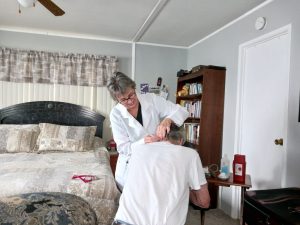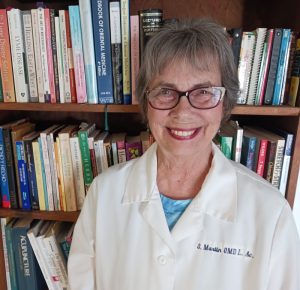 Practicing within the roles of both a doctor of Oriental Medicine, and a registered nurse, I see myself as both a health educator, and a person that facilitates self-nuturance. The original meaning of the word “doctor” comes from Latin derivatives meaning “teacher”. To teach is to educate. Subsequently, the word “educate” which derives from the Latin “educere”, means to “draw out”. This meaning speaks so succinctly about how I envision what I do in my practice. I am helping to draw out knowledge that lies within each individual. I am merely the bridge that enables the individual to utilize that knowledge and transform from a place of dis-ease, or dis-comfort, to a place of wellness.
Practicing within the roles of both a doctor of Oriental Medicine, and a registered nurse, I see myself as both a health educator, and a person that facilitates self-nuturance. The original meaning of the word “doctor” comes from Latin derivatives meaning “teacher”. To teach is to educate. Subsequently, the word “educate” which derives from the Latin “educere”, means to “draw out”. This meaning speaks so succinctly about how I envision what I do in my practice. I am helping to draw out knowledge that lies within each individual. I am merely the bridge that enables the individual to utilize that knowledge and transform from a place of dis-ease, or dis-comfort, to a place of wellness.
I believe it is my role to teach individuals that the healing process emanates from an internal healing intelligence, and is a movement of energy that moves in a direction from within to without, seeking balance in the 3 realms of body, mind, and spirit. In association with this belief, I believe that the responsibility for healing is a personal one. Each individual assumes all levels of responsibility, moral, physical, and financial. It is the action of personal assumption for obtaining health that actually ignites the flame of the healing process.
It is interesting to note that the word “nurse” has a Latin derivative “nutricius”, meaning “one who nourishes”. When I was a child of 7 years old, my big wish for Christmas was to have both a toy nurse kit and a doctor kit, so it must have been my soul’s desire to be a health care provider. This play acting with my toy kits that I did in childhood enabled my own growth and development as a healer and with the support of my own nurturing family to accomplish that end, it became rather instinctive for me to engage with patients using a nurturing, compassionate, spirit. I have seen that when we can apply a spirit of nurturance and compassion in any relationship, whether it be a doctor/patient; a husband/wife; or an employer/employee, we foster that nurturing, compassionate spirit in others. That will enable those seeking improved health to integrate principles of self-nurturance in body, mind, and spirit in themselves.
 What I have learned from over 25 years of the practice and study of the principles of Chinese Medicine is that the most important elements in maintaining optimum health is for one to actively seek moderation and balance in all things, nurturing those deep aspects of self that strives for excellence. One must seek avenues to balance work life with family life, and secular life with spiritual life. Through self-love, and self-care one has a greater potential for expressing compassion and love to their neighbor and to their physical environment. This exchange of love from “within to without” then from “without to within” has a profound impact on healing.
What I have learned from over 25 years of the practice and study of the principles of Chinese Medicine is that the most important elements in maintaining optimum health is for one to actively seek moderation and balance in all things, nurturing those deep aspects of self that strives for excellence. One must seek avenues to balance work life with family life, and secular life with spiritual life. Through self-love, and self-care one has a greater potential for expressing compassion and love to their neighbor and to their physical environment. This exchange of love from “within to without” then from “without to within” has a profound impact on healing.
We sometimes get confused by modern health practices. We think if we just take these vitamins, or if we just eat this type of food, or take this medication, we will be well, but wellness is more than just having the right balance of a physical state of being. As we have learned through years of research, the person’s mental state plays a most vital role in health, so it is most important that each individual develop practices that reduce fear, harness anger, and dissipate obsessive thought processes. Many disciplines can help with these emotional obstacles, but what I believe helps the most are regular spiritual practices. I believe that when the soul, or spirit has abundant health, this overflows into our emotional body, nourishing those aspects of self that strives to feel acceptance, hope, love, as well as a sense of belonging & purpose. In turn, emotional health results, and then the ultimate outcome of physical health will be accomplished.
In summary, medical intervention should strive to nurture the whole person, and implement treatment plans that include patient education, and practices that adopt methods to nurture body, mind, and spirit. The interaction of the practitioner and patient should have the rapport that establishes a plan that can be placed in the context of hope; not only because of human values, but also because excellence of medical care calls for attention to the human spirit.